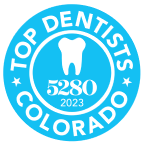 Only a decade ago, most people were not aware of the link between oral health and overall health. Today, it is becoming common knowledge. Did you know that over 80 percent of people in the United States suffer from some form of periodontal disease? Because this condition rarely causes pain, it often goes undiagnosed. This can wreak havoc on your overall wellbeing. If you are seeking dental care or treatments for gum disease in Lone Tree, we can help. At Metropolitan Dental Care, our Lone Tree dentists offer preventative care and periodontal treatments to keep your teeth and gums healthy for a long-lasting smile.
Only a decade ago, most people were not aware of the link between oral health and overall health. Today, it is becoming common knowledge. Did you know that over 80 percent of people in the United States suffer from some form of periodontal disease? Because this condition rarely causes pain, it often goes undiagnosed. This can wreak havoc on your overall wellbeing. If you are seeking dental care or treatments for gum disease in Lone Tree, we can help. At Metropolitan Dental Care, our Lone Tree dentists offer preventative care and periodontal treatments to keep your teeth and gums healthy for a long-lasting smile.
How Does Oral Health Affect Heart Health?
When you have gum disease, there is infection present in your gums. This same infection, caused by bacteria, is also present in your bloodstream. Therefore, these bacteria can stick to the fatty plaques in the bloodstream and travel to all your major organs. When the infection reaches the heart, the bacteria can attach themselves to damaged tissue, leading to inflammation. If the tissues of the heart become inflamed, it can cause illnesses such as atherosclerosis, endocarditis, and stroke.
How Do I Know If I Am at Risk?
If you have gingivitis or gum disease, you have a higher risk of heart disease. Inadequate oral hygiene can lead to these problems as well, because the plaque deposits that accumulate on the teeth contain bacteria, which can seep into the bloodstream. You could have gum disease if you notice:
- Tender, swollen, bleeding gums
- Active drainage, pus, or infection near the gum line
- That the gums seem to be “pulling away” from the teeth
- A bad taste or bad breath
- Tooth mobility or shifting
- An obvious difference in the way your teeth fit together
Diagnosing Gum Disease
If you notice any of the symptoms listed above, it is important to see your dentist for an evaluation. Our periodontist at Metropolitan Dental Care can perform a thorough assessment of your gums, and measure the pockets around the teeth using a specialized dental instrument called a periodontal probe. Generally, anything that is five millimeters or higher signifies gum disease.
Treating Gum Disease
If you are diagnosed with gum disease, there are several treatments that can be performed, depending on the severity of your situation. If you have gingivitis, and have not experienced bone loss yet, you can reverse the condition with a dental cleaning and improved oral hygiene.
If you are in the early stages of gum disease, we can perform scaling and root planing. This procedure cleans deep below the surface of the gums, sweeping away debris and bacteria. The roots of the teeth are also smoothed to discourage further irritants from building up.
If your condition has advanced to severe gum disease, you may require surgery to address the disease. Dr. Mike Norouzinia, our periodontist, can discuss your options with you.
How to Prevent Gum Disease
Some people are simply more genetically prone to gum disease. If this is true for you, increasing the frequency of your dental cleanings can make a significant difference. Between visits, it is important to maintain optimal oral hygiene. Therefore, you should brush twice a day at minimum, and floss once a day. As a supplement, you can purchase an ADA-approved mouthwash to help eradicate the bacteria that causes gum disease.
Find Out More
To learn more about the connection between oral health and heart disease, reach out to a team member. We can help you develop an oral care regimen that will address your specific needs. Contact our Denver or Lone Tree location online today, or call us at 303.534.2626.

